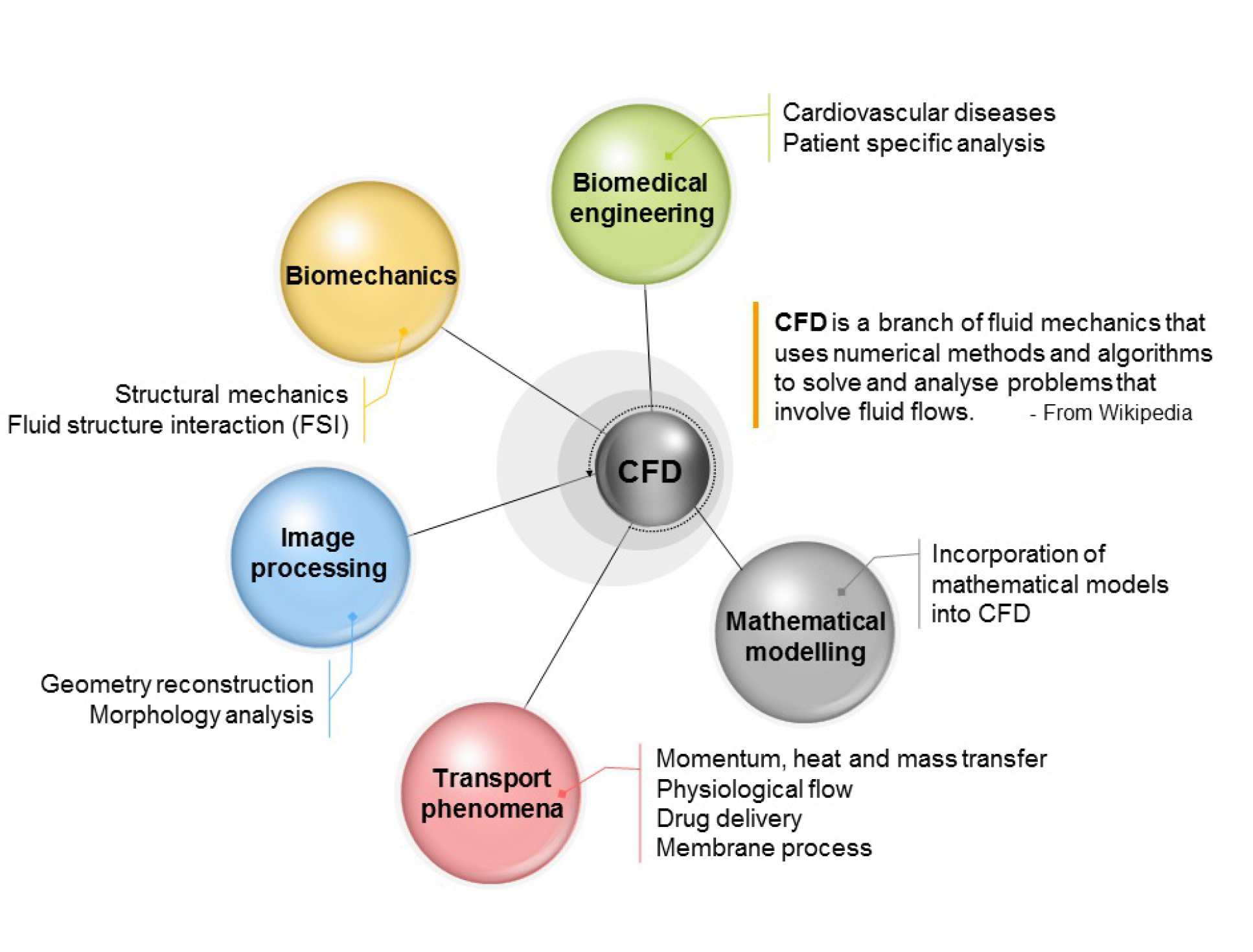Our research is based on the application of numerical methods to delineate the solutions to practical transport phenomena problems. Our group specialises in application of engineering principles to answer questions related to pathophysiological blood flow, drug delivery, and biomechanical analyses of blood vessels, design and optimization of bioreactors, and membrane separation processes.  Infographic showing the Xu Group research streams.
Infographic showing the Xu Group research streams.
Projects
"Computational analysis of the hemodynamic performance of novel endovascular and surgical procedures for complex aortic diseases"
Research Associate: Yu Zhu.
"Development of an integrated clinical imaging and computational modelling workflow for non-invasive assessment of hemodynamics in pulmonary hypertension - towards a digital twin."
Research Associate: Chloe Armour.
"Predicting aortic growth and disease progression in Type B aortic dissection."
Research student: Kaihong Wang.
"Multiscale modelling of thrombolytic therapies for the treatment of ischemic stroke."
Research student: Yilin Yang.
"Evaluate the impact of myocardial trabeculae on cardiac function through hydrodynamic effects."
Research student: Sihan Jiang.
"AI-Assisted Biomechanics Modelling of Thoracic Endovascular Aortic Repair."
Research student: Binghuan Li.
"Multiscale modelling of valve thrombosis following bioprosthetic aortic valve implantation."
Research student: Zhongjie Yin.
"Mathematical modelling of nanoparticle transport through tumours for application in radiotherapy"
Research student: George Caddy.
“Modelling of reverse osmosis membrane process and transport phenomena for performance analysis and optimisation”
Research student: Boram Gu.
"Patient-specific assessment of hemodynamic performance of Transcatheter Aortic Valve Implantation (TAVI)"
Research student: Selene Pirola.
"Development of a multiphysics model for focused ultrasound-mediated drug delivery to brain tumour"
Research student: Yu Huang.
"Multi-scale modelling of drug delivery to solid tumors"
Research student: Moath Alamer.
“Predicting thrombus formation in Type B aortic dissection”
Research student: Claudia Menichini.
"Evaluation of carotid artery stents by using combined ultrasound and OCT imaging for patient-specific analysis"
Research student: Nasrul Hadi Johari.
“In-vivo Assessment of The Hemodynamic Performance of Different Aortic Valve and Root Prostheses Using 4D-Cardiac Magnetic Resonance Imaging and Computational Modelling”
Research Associate: Dr. Zhuo Cheng.
“Analysis of haemodynamic forces in fenestrated and branched stent-grafts for abdominal aortic aneurysms”
Research student: Harkamaljot Kandail.
“Development of a multi-physics model for thermosensitive liposomal delivery of drugs activated by focused ultrasound”
Research student: Andris Piebalgs.
“Development of theranostic nanoparticles; MRI-responsive, thermosensitive drug carriers activated by MRg FUS for local tumour drug release”
Research associate: Dr. Cong Liu
“Development of thermal sensitive liposomes for targeted delivery and controlled release of drug”
Research student: Xin Zhang.
“Analysis of carotid wall mechanics based on ultrasound imaging”
Research student: Zhongjie Wang.
“Biomechanical study of abdominal aortic aneurysm (AAA) enlargement after endovascular ane urysm repair (EVAR)”
Visiting academic: Dr Anqiang Sun.
“Mathematical Modelling of Drug Delivery to Solid Tumour”
Research student: Wenbo Zhan.
“Analysis of blood flow in the pulmonary arteries of patients with Eisenmenger syndrome”
Research student: Afet Mehmet.
“Effect of ageing on carotid artery morphology, hemodynamics, and the development of atherosclerosis”
Researcher: Claudio Carallo.
“Development of computational methods for personalised assessment of the biomechanical functions of the Marfan aorta”
Research student: Shelly Singh.
“Analysis of morphology and flow in the aorta: comparison between bicuspid and tricuspid aortic valves”
Research student: Oluwatoyin Fatona.
“Investigation of geometric features and flap motion on the progression of aortic dissection”
Research student: Ana Crispin Corzo.
"Understanding the effects of turbulence and transition in patients with aortic valve disease and different aortic valve prostheses"
Research student: Emily Manchester.
"Analysis of haemodynamics and biomechanics of endografts for complex aortic arch repair"
Research student: Sampad Sengupta.
"Development of an integrated computational framework for prediction of treatment outcomes in aortic dissection patients"
Research student: Mei Yan Chong.
"Predicting stent induced new entry evolution in patient-specific Stanford B aortic dissection model".
Research student: Xiaoxin Kan.
"Computational analysis of the hemodynamic performance of novel endovascular and surgical procedures for complex aortic diseases"
Research student: Yu Zhu.
"Development of engineered liposomes for targeted thrombolytic therapy”
Research associate: Boram Gu.
"Predicting the Outcome of TEVAR for Type B Aortic Dissection"
Research student: Chloe Armour.
The Department of Chemical Engineering has up to 15 fully-funded scholarships available for PhD applicants (Departmental Scholarships and EPSRC DTP Studentships) per academic year. Please check the scholarships website for the project availablity offer to successful candidates.
Contact us
Room 1M17, ACE Extension Building
Department of Chemical Engineering
Imperial College London, South Kensington Campus
London, SW7 2AZ, UK
Tel: +44 (0)207 594 2562